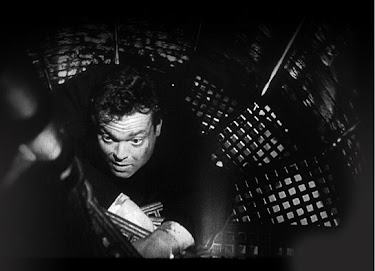Written by: Raymond Chandler
Starring: Alan Ladd, Veronica Lake, William Bendix, Howard Da Silva, Doris Dowling, Tom Powers, Hugh Beaumont, Howard Freeman, Don Costello, Will Wright
The Blue Dahlia (1946) is the third of four films in which Alan Ladd and Veronica Lake co-starred, and, of the three I've seen, it's probably the weakest, although only by the slightest of margins {the pair's obscure fourth collaboration, Saigon (1948), may take a little while longer to track down}. The film, directed by George Marshall from an original Raymond Chandler screenplay, is nonetheless a tense and exciting film noir thriller, with strong characters and good performances from a talented cast. The most incomprehensible film of 1946 was certainly Howard Hawks' The Big Sleep (1946) {adapted from Chandler's novel}, but this one still contains a genuinely baffling murder mystery, with enough red herrings to use as fishing bait. Ladd stars as Johnny Morrison, a recently-discharged bomber pilot who returns home to find out that his wife (Doris Dowling) has been unfaithful to him. When Helen Morrison winds up dead, Johnny is the prime suspect, and his predicament is only worsened by his resolve to avoid capture and solve the case himself.
 Of course, Ladd is joined in the film by his previous co-stars from The Glass Key (1942) – namely, Veronica Lake and William Bendix. Lake, as usual, looks positively luminous, and her every line of dialogue sparkles precisely because she's the one saying it. Joyce Harwood is a strong character, as was Lake's role in This Gun for Hire (1942), her independence highlighted by her rather questionable decision to offer a ride to a lonely man strolling through the rain. Bendix is always entertaining to watch, and here he plays one of Ladd's sympathetic war buddies, who suffered a shrapnel head wound in the war and is plagued by incessant migraines caused by what he describes as "monkey music." Howard Da Silva lends some smarm as the conceited night-club owner who carried on a relationship with Ladd's wife, and could easily have committed her murder. Also worth mentioning is Will Wright as a sleazy, opportunistic hotel detective who knows more than he should, and is quite willing to sell what he knows.
Of course, Ladd is joined in the film by his previous co-stars from The Glass Key (1942) – namely, Veronica Lake and William Bendix. Lake, as usual, looks positively luminous, and her every line of dialogue sparkles precisely because she's the one saying it. Joyce Harwood is a strong character, as was Lake's role in This Gun for Hire (1942), her independence highlighted by her rather questionable decision to offer a ride to a lonely man strolling through the rain. Bendix is always entertaining to watch, and here he plays one of Ladd's sympathetic war buddies, who suffered a shrapnel head wound in the war and is plagued by incessant migraines caused by what he describes as "monkey music." Howard Da Silva lends some smarm as the conceited night-club owner who carried on a relationship with Ladd's wife, and could easily have committed her murder. Also worth mentioning is Will Wright as a sleazy, opportunistic hotel detective who knows more than he should, and is quite willing to sell what he knows. I suppose that film noir, at its heart, is all about fate, and how it never works in our favour. If something can go wrong, it will. Audiences have always been willing to suspend disbelief on such unlikely coincidences, but I think that here Chandler bites off more than he could chew. Not only does Bendix unknowingly go off with Ladd's adulterous wife (an acceptable enough twist of chance), but, of all the rain-soaked people that Lake might have picked up off the side of the road, it happens to be the very person whose soon-to-be-deceased wife was having an affair with her husband. Had the pair met outside, say, Harwood's night-club, this happenstance might have been easier to digest, but, as it stands, the absurd coincidence only distracts from the storyline. No matter – the story itself is filled with unlikable characters and dubious motives, and with gunfire and murder in great abundance. Getting beaten up was always something that Ladd could accomplish most convincingly, and his frantic tussle with two armed gangsters is the highlight of the film.
I suppose that film noir, at its heart, is all about fate, and how it never works in our favour. If something can go wrong, it will. Audiences have always been willing to suspend disbelief on such unlikely coincidences, but I think that here Chandler bites off more than he could chew. Not only does Bendix unknowingly go off with Ladd's adulterous wife (an acceptable enough twist of chance), but, of all the rain-soaked people that Lake might have picked up off the side of the road, it happens to be the very person whose soon-to-be-deceased wife was having an affair with her husband. Had the pair met outside, say, Harwood's night-club, this happenstance might have been easier to digest, but, as it stands, the absurd coincidence only distracts from the storyline. No matter – the story itself is filled with unlikable characters and dubious motives, and with gunfire and murder in great abundance. Getting beaten up was always something that Ladd could accomplish most convincingly, and his frantic tussle with two armed gangsters is the highlight of the film.7/10
Currently my #4 film of 1946:
1) It’s A Wonderful Life (Frank Capra)
2) The Big Sleep (Howard Hawks) *
3) Notorious (Alfred Hitchcock) *
4) The Blue Dahlia (George Marshall) *
5) Dragonwyck (Joseph L. Mankiewicz)
2) The Big Sleep (Howard Hawks) *
3) Notorious (Alfred Hitchcock) *
4) The Blue Dahlia (George Marshall) *
5) Dragonwyck (Joseph L. Mankiewicz)





_poster.jpg)


No comments:
Post a Comment